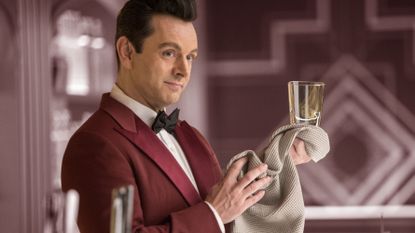

Passengers has generated a lot of controversy thanks to the slightly disturbing fact that the movie is about a man who unequivocally ruins a stranger's life, and then manipulates her into falling in love with him (more details over this way). The film is complex and challenging, and brings up a lot of questions—so we hopped on the phone with star Michael Sheen—who plays robot-friend to Chris Pratt and Jennifer Lawrence—for answers.
WARNING: Spoilers lie ahead.
MC: Do you agree with Aurora's [Jennifer Lawrence's character] decision to forgive Jim [Chris Pratt's character] for what he did to her? That was the most interesting part of the movie for me—whether or not I could be on board with their relationship.
MS: "I agree. When I watched it, I was really struck by the moral question at the heart of the story. You can't help but put yourself in their position and think, 'Would I have done that? Would I not have done that?' The fact that Chris plays a character who's so likable makes it even harder, because it's very hard to be against him. You kind of understand where he's coming from, but at the same time, you do kind of think 'maybe it is unforgivable, what you've done.'"
"You can't help but put yourself in their position and think, 'Would I have done that? Would I not have done that?'"
MC: Right, exactly.
MS: "As in all good romance stories, you can't help but want them to be together again. Yet at the same time you have to grapple with the situation—like you said, it's very complicated and really draws you in. In a lot of really interesting, challenging, and entertaining movies, there's always that central question where you put yourself in that position and there's never an easy answer. The fact that the people you're watching are so likable and attractive—I don't just mean physically—you want things to work out for them, and that kind of makes it even harder, doesn't it?"
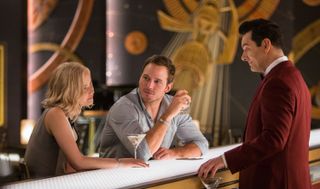
"There are no easy answers with it. Even though most couples thankfully don't have to deal with the same problem, any relationship has to deal with certain things which for some people are absolute deal breakers, while other people find a way through it. It's a really universal thing for anyone who has to deal with a relationship. It may not be quite as extreme as circumstances are for Jim and Aurora, but it's all relative—everyone has that thing where they're like 'I don't know if I can work through this.' Some people are able to, and some of the best relationships are based on that."
Stay In The Know
Marie Claire email subscribers get intel on fashion and beauty trends, hot-off-the-press celebrity news, and more. Sign up here.
MC: The film is set during a time when earth is so over populated that you can't even build a house, let alone grow anything on a farm. There was an interesting message of environmentalism at play. Was that a draw for you?
MS: "Those elements became things I started to think about later on—they didn't stand out to me initially. But as I thought about it more, that aspect was really interesting. And also the idea that Jim is part of a group of people who have felt like their usefulness has been overlooked. He works from his hands—he's not part of an elite of any kind. He's an immigrant, you know? He's going on a perilous journey to start a new life."
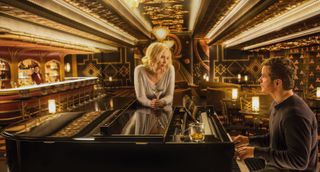
Marie Claire: Passengers has an element of escapism that the movie-going public may appreciate right about now—but will the political situation in this country change the kinds of roles you take in the future?
Michael Sheen: "In terms of whether what's going on affects my choice of projects—in a way it makes me want to do projects that are less about escapism and more about what's going on. I think every story that we tell, people can only enjoy if it speaks to them and their situation. It's just that certain genres give the illusion of being an escape from real life—but really, it's always about real life. Science fiction tricks you into looking at reality in a different way."
"it makes me want to do projects that are less about escapism and more about what's going on."
MC: It's interesting that this film came out around the same time as Westworld, which deals with the humanity of robots. Seeing Westworld before Passengers really informed my viewing of Arthur, and made me think of him as being much more than a robot. Do you think he has consciousness?
MS: "My starting point for Arthur was: what has he been programmed to do? He was created to be the perfect bartender, and part of that is adapting to the needs of the people he works with. In these circumstances, his programming and circumstances collide to make him more and more human, and to push Arthur into stretching out and discovering new experiences. It made me think of Pinocchio: Arthur wants to be a real boy."
MC: Chris Pratt mentioned learning a lot from Jennifer Lawrence on this film. Did you have that experience too?
MS: "Acting with anyone is always a learning experience. I was really impressed by Chris' commitment to this role, and both of them—Chris and Jen—found something much deeper in the roles. I loved how playful they both were, and how prepared they were to go to the much darker elements of the characters. Because they're so enjoyable and such attractive presences on screen, that combination of qualities was fantastic."
Follow Marie Claire on Facebook for the latest celeb news, beauty tips, fascinating reads, livestream video, and more.

Mehera Bonner is a celebrity and entertainment news writer who enjoys Bravo and Antiques Roadshow with equal enthusiasm. She was previously entertainment editor at Marie Claire and has covered pop culture for over a decade.
-
 Prince Louis Turns 6—See the Adorable New Photo
Prince Louis Turns 6—See the Adorable New PhotoPrincess Kate was behind the lens.
By Iris Goldsztajn Published
-
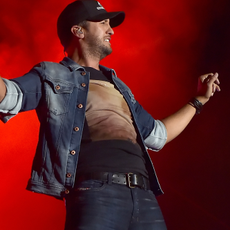 Luke Bryan Trips Over a Fan's Phone During a Show, Jokes "My Lawyer Will Be Calling"
Luke Bryan Trips Over a Fan's Phone During a Show, Jokes "My Lawyer Will Be Calling"He thought it was hilarious.
By Iris Goldsztajn Published
-
 Melissa McCarthy Defends Meghan Markle From Critics Who Are "Threatened" by Her
Melissa McCarthy Defends Meghan Markle From Critics Who Are "Threatened" by HerMcCarthy once starred in the duchess' 40th birthday video.
By Iris Goldsztajn Published
-
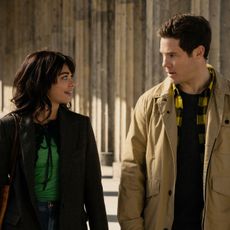 Sarah Hyland and Adam Devine Play 'How Well Do You Know Your Co-Star?'
Sarah Hyland and Adam Devine Play 'How Well Do You Know Your Co-Star?'The 'Modern Family' stars reunited for the 'Pitch Perfect' spinoff series.
By Brooke Knappenberger Published
-
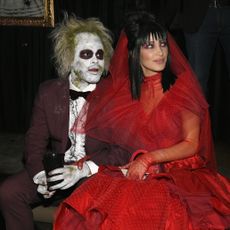 The 78 Best Celebrity Couple Halloween Costumes of All Time
The 78 Best Celebrity Couple Halloween Costumes of All TimeHonestly, we're impressed.
By Charlotte Chilton Published
-
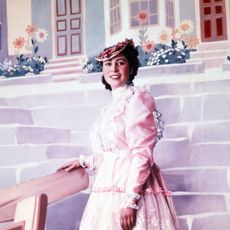 Super Rare Photos of Queen Elizabeth as a Young Woman
Super Rare Photos of Queen Elizabeth as a Young WomanFrom childhood snapshots to portraits as a young princess, beautiful and rare photos of the late Queen Elizabeth as a young woman.
By Mehera Bonner Published
-
 King Charles III and Queen Consort Camilla's Relationship: A Timeline
King Charles III and Queen Consort Camilla's Relationship: A TimelineWith the passing of Queen Elizabeth II, Charles has ascended to the throne as king.
By The Editors Published
-
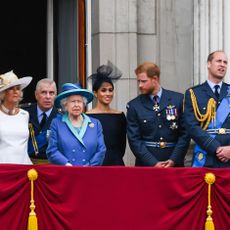 Who Is Next in Line for the British Throne, Explained
Who Is Next in Line for the British Throne, ExplainedAnd yes—Harry and Archie are still in the line of succession.
By Andrea Park Published
-
 Who Is Alexandria Ocasio-Cortez's Fiancé Riley Roberts?
Who Is Alexandria Ocasio-Cortez's Fiancé Riley Roberts?AOC's husband-to-be is an "easygoing redhead" who lives with her in D.C.
By Katherine J. Igoe Published
-
 68 Times the Kardashians Posed Fully Nude and Owned It
68 Times the Kardashians Posed Fully Nude and Owned ItAnd we mean fully nude—as in, not a shred of clothing.
By Bianca Rodriguez Published
-
 Who Is Jonathan Owens, Simone Biles's Fiancé and NFL Player?
Who Is Jonathan Owens, Simone Biles's Fiancé and NFL Player?"The easiest yes!" Simone wrote about the couple's engagement.
By The Editors Published
